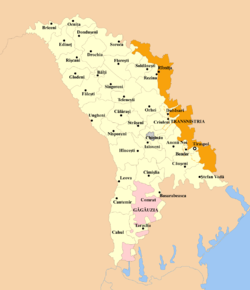Transnistria autonomous territorial unit with special legal status
| Transnistria autonomous territorial unit with special legal status |
||
|---|---|---|
 Location and extent of the Autonomous territorial unit with special juridical status Transnistria (brown) within Moldova (white).
|
||
| Capital | Tiraspol | |
| Languages | ||
| Legislature | Supreme Council | |
| Autonomous territorial unit of Moldova | ||
| • | Created | July 27 2005[4] |
| Area | ||
| • | Total | 4,163 km2 1,607 sq mi |
| • | Water (%) | 2.35 |
| Population | ||
| • | 2014 estimate | 505,153[5] |
| • | 2004 census | 555,347 |
| • | Density | 124.6/km2 345/sq mi |
| Currency | Transnistrian ruble (PRB) | |
| a. | Using Latin script. | |
Transnistria, officially the Transnistria autonomous territorial unit with special legal status (Moldovan: Унитатеа тертьорялэ аутономэ ку статут журидик сречял Транснистря, Unitatea teritorială autonomă cu statut juridic special Transnistria; Russian: Автономное территориальное образование с особым правовым статусом Приднестровье; Ukrainian: Автономне територіальне утворення з особливим правовим статусом Придністров'я) is a formal administrative unit of Moldova established by the Government of Moldova to delineate the territory controlled by the unrecognized Pridnestrovian Moldavian Republic.
History
- From the late 1980s until end of 1991, there was a dissolution of the Soviet Union.
- In 1992 there was a war of Transnistria between the Republic of Moldova and the unrecognized state Pridnestrovian Moldavian Republic on the part of territory of the former Moldavian Soviet Socialist Republic. From the end of the war until present time there is territory, which is claimed by Moldova, but is controlled by the Pridnestrovian Moldavian Republic, and there is a territory, which is claimed by the Pridnestrovian Moldavian Republic, but is controlled by Moldova
- On 22.07.2005 Autonomous territorial unit with special legal status Transnistria was established in Moldova[4]
Territory
Territory of Autonomous territorial unit with special legal status Transnistria is mostly coincides with territory of Pridnestrovian Moldavian Republic, but there are principal differences:
- Bender is included to Pridnestrovian Moldavian Republic, but is excluded from Autonomous territorial unit with special legal status Transnistria
- Territories, which are claimed by Pridnestrovian Moldavian Republic, but controlled by Moldova, are excluded from Autonomous territorial unit with special legal status Transnistria. This territories are included into Dubasari District, Causeni District and Anenii Noi District.
Settlements
There are 147 settlements in Transnistria (settlements of left bank of Dnestr): 1 municipality, 9 towns, 2 settlements, which are parts of towns, 69 villages (communes), 135 settlements, which are parts of villages (communes).[6]
References
- ↑ Roudik, Peter (23 December 2013). "Moldova: Romanian Recognized as the Official Language". Law Library of Congress. Retrieved 13 June 2014.
- ↑ "The text of the Declaration of Independence prevails over the text of the Constitution". Constitutional Court of Moldova. 5 December 2013. Retrieved 13 June 2014.
- ↑ Law № 173 from 22.07.2005: "About main notes about special legal status of settlements of left bank of Dnestr (Transnistria)" - Article 6: in Moldovan; in Russian.
- 1 2 Law № 173 from 22.07.2005 "About main notes about special legal status of settlements of left bank of Dnestr (Transnistria)" - Article 3: in Moldovan; in Russian.
- ↑ "Moldova". Citypopulation. 1 January 2014. Retrieved 17 April 2014.
- ↑ Law № 764 from 27.12.2001 "About administrative-territorial division of Republic of Moldova" - Appendix 5: Moldovan, Russian
External links
- (Romanian) Law № 173 from 22.07.2005 "About main notes about special legal status of settlements of left bank of Dnestr (Transnistria)"
- (Russian) Law № 173 from 22.07.2005 "About main notes about special legal status of settlements of left bank of Dnestr (Transnistria)"